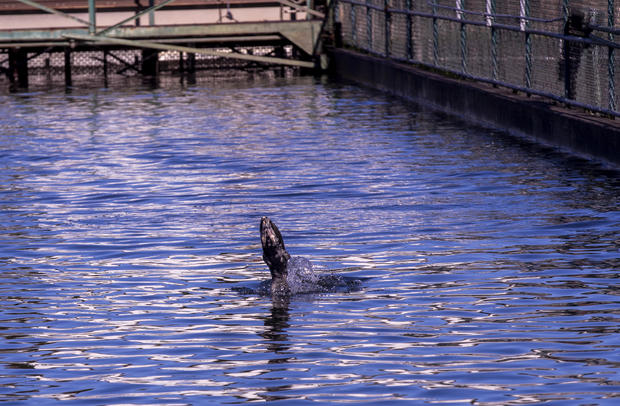A federal regulatory group voted Thursday to officially close the fishing season for king salmon, also known as chinook, along much of the West Coast after near-record low numbers of the fish returned to California rivers last year.
The Pacific Fishery Management Council has approved the 2023 season closure for the commercial and most recreational chinook fishery along the coast from Cape Falcon in northern Oregon to the California-Mexico border. Limited recreational salmon fishing will be allowed from southern Oregon in the fall.
“Chinook returns to California rivers this year are predicted to be near record lows,” Council Chairman Mark Gorelnick said in a news release after the vote. “The poor state of the freshwater environment that contributes to these low predicted returns is unfortunately not something the council can do or control.”
California It was already last month Salmon fishing has been banned for the rest of the season. According to CBS Bay Area, marking the second time in state history that California has canceled its salmon fishing season, with the last ban occurring between 2008 and 2009, also due to drought conditions.
Biologists say Chinook salmon populations have declined dramatically after years of drought. Many in the fishing industry say Trump-era rules that have allowed more water to be diverted from the Sacramento River basin for agriculture have done more damage.
Allen J. Schaben/Los Angeles Times via Getty Images
The closure applies to adult fall-run chinook and deals a blow to the Pacific Northwest’s salmon fishing industry.
Most of the salmon caught in Oregon originates in California’s Klamath and Sacramento rivers. After spawning in freshwater, they spend an average of three years maturing in the Pacific, where many are taken by commercial fishermen, before returning to their spawning grounds, where conditions are more ideal for spawning. Eggs die after laying.
The Council is an advisory group to the US Secretary of Commerce, which makes the final decision, but has historically followed the Council’s rulings. The Secretary’s decision will be posted in the Federal Register within a few days.
Experts fear the native California salmon is on the verge of extinction. Already California’s spring-run chinook are listed as threatened under the Endangered Species Act, while winter chinook are endangered along with the Central California Coast coho salmon, which have been off-limits to California commercial fishermen since the 1990s.
Recreational fishing is expected to be allowed in Oregon only for coho salmon and for chinook after Sept. 1. The salmon season is expected to open normally north of Cape Falcon, including along the Columbia River and along the Washington coast.
Although the shutdown will affect hundreds of thousands of jobs, few people are opposed to it. Many fishermen said they want to take action now to guarantee healthy stocks in the future.
They hope that an unusually wet winter in California that has left most of the state drought-free will bring relief. An unprecedented series of powerful storms filled most of California’s reservoirs, dumped record amounts of rain and snow, and destroyed three years of severe drought. But too much water flowing through rivers can kill eggs and young.

